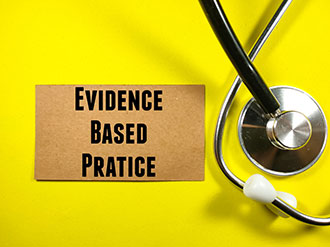|
|
Last Modified on Jun 19, 2025
Among the things that impact patient safety at hospitals is what sorts of practice methods are used at hospitals.
One practice method research has pointed to as having care quality benefits is evidence-based practice. This health care strategy focuses on an integration of patient values/preferences, clinician expertise and research evidence. Studies have indicated an association between this practice method and positive things like improved patient experiences, better population health, reduced costs and high-quality care.
How prevalent is use of evidence-based practice in hospitals? Not very, a recent study indicates.
In the study, 276 chief nurse executives at health care facilities throughout the U.S. were surveyed. They were asked about various things including what priorities the institutions they worked at had.
The responses of these individuals indicated that evidence-based practice rated low among health care institution priorities. Also, over half of the survey’s respondents indicated that, at their institution, evidence-based practice was either only used somewhat or not used at all.
Another thing the study found was that a fair amount of hospitals are falling short on key quality and safety indicators. The study’s leader argues that the lack of strong use of evidence-based practice is a contributor to these shortcomings.
Do you think hospitals in Louisiana and the rest of the U.S. should be putting a higher priority on evidence-based practice? Do you think evidence-based care will become more prevalent in the future?
One hopes all hospitals will do everything they can to ensure high-quality care and reduce the likelihood of medical errors and other events that could compromise patient safety. When a person is harmed because a hospital’s care fell short of what it should have been, experienced attorneys can give them guidance on the possible pursuit of legal remedies.
Source: The Ohio State University, “Evidence-based health care: the care you want, but might not be getting,” Meggie Biss, Feb. 1, 2016





